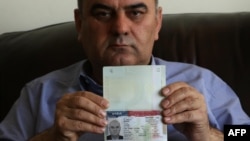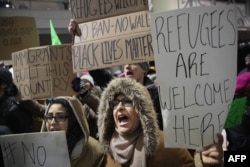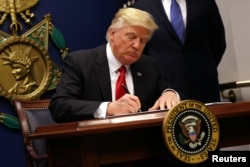Public fury over the Trump administration’s ban on travel from several Muslim majority countries may not be abating, but many Muslims in the Middle East and beyond are taking the measure in stride.
The ban on travel from seven predominantly Muslim nations - Iraq, Iran, Syria, Somalia, Sudan, Libya and Yemen – has triggered vocal condemnations from Baghdad and Tehran, but elsewhere in the Islamic world, the criticism has remained subdued.
It took the world’s largest body of Islamic countries more than two days to react, and only with a carefully worded statement that fell short of the denunciation heard in the United States and Europe.
The Saudi-based, 57-nation Organization of Islamic Conference expressed “grave concern” about the measure, saying it would “only serve to embolden the radical narratives of extremists and will provide further fuel to the advocates of violence and terrorism.”
In addition to barring citizens of the seven Muslim countries from traveling to the United States for 90 days, the executive order includes a 120-day suspension of refugee admissions.
The most forceful reaction came from Iran, which threatened retaliatory measures to bar Americans.
Iran's Foreign Minister Mohammad Javad Zarif said the move “will be recorded in history as a great gift to extremists and their supporters.”
The Iraqi response was just as sharp, with parliament calling for a reciprocal travel ban on Americans if Washington does not withdraw its decision. But reaction from other Muslim countries, including those affected by the ban, was more measured.
Sudan’s foreign minister told Bloomberg the government would “wait until the period mentioned, until the executive decision passes and see what is next after that and then we’ll act accordingly.”
Pakistan's Interior Minister Chaudhry Nisar said Monday it would “not affect terrorism but it will increase the problems for those who are victims of terrorism.”
And in the Middle East, while the ban sparked criticism of the Trump administration on social media and television, the governments have opted to remain silent.
The government of Turkey has yet to comment, although a member of parliament from the ruling party called the ban "inhumane and insensitive."
Saudi Arabia and the United Arab Emirates, two key U.S. allies in the region, have remained silent.
The government of Egypt, another U.S. ally, has similarly kept mum, as has the al-Azhar, the government controlled center of religious scholarship that often takes public positions on issues of concern to Muslims around the world.
One reason Middle Eastern governments have kept quiet is that most do not want to antagonize the Trump administration and have a vested interest in boosting ties with the U.S. While Egypt wants the Trump administration to designate the Islamist Muslim Brotherhood as a terrorist organization, Saudi Arabia and other Gulf countries are welcoming the administration's pledge to take a tougher line against Iran.
"So it serves them well to stay silent," said Hilal Khashan, a professor of political science at the American University of Beirut.
On the campaign trail, Trump vowed to rebuild alliances with "moderate" Middle Eastern countries such as Egypt and Jordan to fight Islamic State.
Trump has vigorously defended his executive order, saying it “is about terror and keeping our country safe” and not “a Muslim ban.”
In a statement issued Sunday, he said the seven countries included in the travel ban had been identified as “countries of concern” under the Obama administration.
But experts have questioned the choice, noting that no one with family backgrounds in the seven countries has been implicated in a deadly terrorist attack in the United States since the attacks of September 11, 2001.
Of the 414 Muslim Americans associated with violent extremism since the attacks, only 23 percent had family backgrounds in the seven countries, according to Charles Kurzman, a professor of sociology at the University of North Carolina at Chapel Hill.
However, “there have been no fatalities in the United States caused by extremists with family backgrounds in these countries,” Kurzman wrote in a report on Muslim involvement in terrorism.
John Esposito, a prominent scholar of Islamic studies at Georgetown University, said that while he vigorously opposed the ban he equally questioned the choice of the seven countries.
“The question becomes, why identify these countries and not identify countries where in fact citizens have been involved in acts of terrorism within the United States,” Esposito said, noting that most of the hijackers that carried out the 9/11 attacks hailed from Saudi Arabia and UAE.
In leaving out Saudi Arabia and other Gulf countries from the list, the Trump administration is largely following a precedent set by past American administrations that put a premium on working with allies at the expense of human rights.
Khashan of AUB voiced concern that the void left by the Arab governments' lack of reaction to the ban may be filled by the very radicals the Trump administration says it wants to quash.






